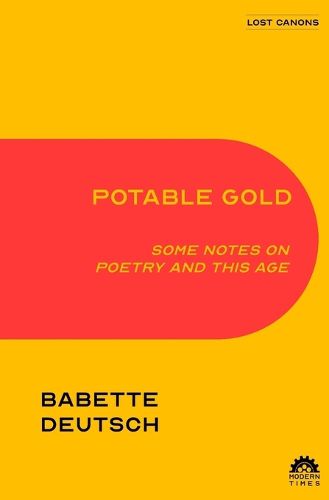Readings Newsletter
Become a Readings Member to make your shopping experience even easier.
Sign in or sign up for free!
You’re not far away from qualifying for FREE standard shipping within Australia
You’ve qualified for FREE standard shipping within Australia
The cart is loading…






From the author of the classic reference work, Poetry Handbook: A Dictionary of Terms, and several critically acclaimed volumes of poetry, this long-forgotten collection of essays brings together elements from a variety of cultures and literary works. Its rhetoric weaves a fascinating narrative, revealing a fresh perspective on the art of poetry as seen through the eyes of an erudite twentieth-century poet who lived and breathed the form. The book also serves as a captivating guide to poetics while reflecting upon changes that took place in human history. Deutsch delves into such events as the industrial revolution, which dramatically influenced all aspects of life in the modern age, and the ways that industrialization affected poetry alongside the the poetic movements it engendered. Like its author, this significant yet forgotten volume positions itself between classical forms and modern times. About the Author:
Babette Deutsch (1895-1982) was born in New York City, where she lived for most of her life. A poet, translator, novelist, editor, critic, and educator, she published in such literary magazines as the New Republic and the North American Review while still a student at Barnard College. She taught at the New School for Social Research and at Columbia University, from which she also received an honorary doctorate in 1946. Banners, her first poetry collection, appeared in 1919 and was followed over the next forty years by four novels, six volumes of children's books, four books on poetry, and numerous translations. She compiled several collections of stories for children as well as anthologies of poetry, and co-translated Alexander Pushkin's Eugene Onegin with her husband, librarian Avrahm Yarmolinsky. Her work combined a range of influences, cultures, and epochs to create a rich visual language. Among the honors and awards she received during her life was The Nation's Poetry Prize (1926).
$9.00 standard shipping within Australia
FREE standard shipping within Australia for orders over $100.00
Express & International shipping calculated at checkout
From the author of the classic reference work, Poetry Handbook: A Dictionary of Terms, and several critically acclaimed volumes of poetry, this long-forgotten collection of essays brings together elements from a variety of cultures and literary works. Its rhetoric weaves a fascinating narrative, revealing a fresh perspective on the art of poetry as seen through the eyes of an erudite twentieth-century poet who lived and breathed the form. The book also serves as a captivating guide to poetics while reflecting upon changes that took place in human history. Deutsch delves into such events as the industrial revolution, which dramatically influenced all aspects of life in the modern age, and the ways that industrialization affected poetry alongside the the poetic movements it engendered. Like its author, this significant yet forgotten volume positions itself between classical forms and modern times. About the Author:
Babette Deutsch (1895-1982) was born in New York City, where she lived for most of her life. A poet, translator, novelist, editor, critic, and educator, she published in such literary magazines as the New Republic and the North American Review while still a student at Barnard College. She taught at the New School for Social Research and at Columbia University, from which she also received an honorary doctorate in 1946. Banners, her first poetry collection, appeared in 1919 and was followed over the next forty years by four novels, six volumes of children's books, four books on poetry, and numerous translations. She compiled several collections of stories for children as well as anthologies of poetry, and co-translated Alexander Pushkin's Eugene Onegin with her husband, librarian Avrahm Yarmolinsky. Her work combined a range of influences, cultures, and epochs to create a rich visual language. Among the honors and awards she received during her life was The Nation's Poetry Prize (1926).